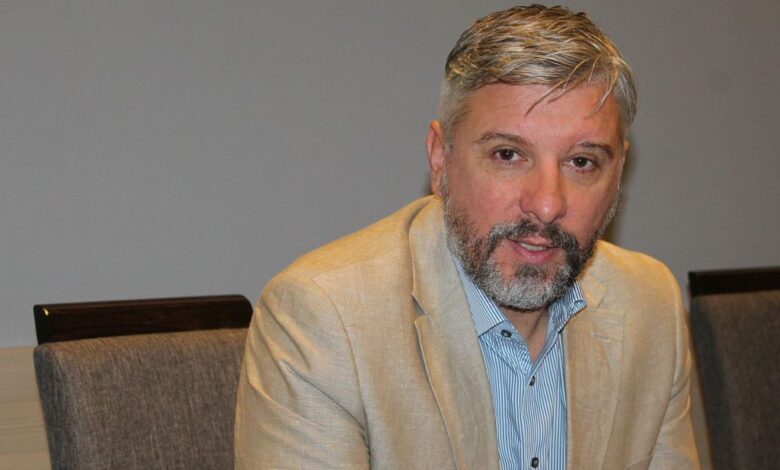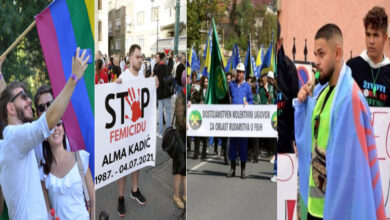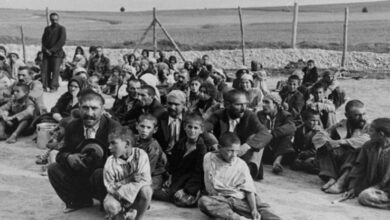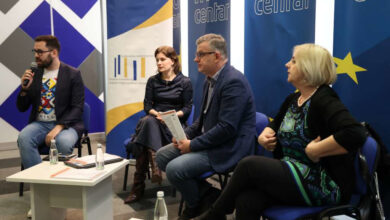HRVOJE KLASIC: No one stood behind Roma after the Second World War

Hrvoje Klasic is one of the most important historians from Croatia, he teaches at the History Department of the Faculty of Philosophy in Zagreb. He is socially engaged, and his documentary series NDH, which is shown on Croatian national TV HRT, was one of the biggest and most ambitious TV projects in recent Croatian history. Hrvoje recently came to Stolac, so we used the opportunity to talk about topics that are rarely talked about, especially from the perspective of history. We talked with Klasic about Roma people, their position today, in the former Yugoslavia, and especially about their suffering in the Second World War.
Is there room for Roma and all of the other national minorities in the countries of the former Yugoslavia and what is their position today compared to the period of the former common state?
KLASIC: When we talk about national minorities, or in general minorities in Europe, but also in our region, we should say that there are minorities and there are Roma. I think that the position of the Roma is incomparable to the position of any other minority and I dont want to talk about the position of the Serbs in Croatia, the Croats in Vojvodina, or the Albanians in Serbia at the same time, because their position, whatever it is, is much better from the position of Roma in any of these communities. Why is this so – the greatest responsibility rests upon the majority peoples, but a large part of the responsibility is borne by the Roma as well.
All of us who are not Roma have so much to find out and learn about Roma, but I am sure from my own experience that most Roma know almost nothing about themselves. Many do not want to know. It's obviously a two-way process.
The suffering of Roma in the Second World War is still unknown to the public. How much is known that the Roma were victims of the Nazi regime?
KLASIC: We often talk about the victims of the NDH, the Ustasha regime, and we mention Serbs and Jews. The genocide committed against them is terrible. But what happened to the Roma is unimaginable! It's just that after the Second World War, the Church and the state stood behind the Serbian community, numerous international organizations stood behind the Jews, and no one stood behind the Roma!
For example, the number of Jews who perished in fascist Italy is 20 percent, in some other countries 40 percent, in NDH territory 80 percent, and people cannot come to their senses. More than 90 percent of the Roma died. If that many of these others had suffered, hundreds of books would have been written, but given that those are Roma, it will never be like that. And that's why we need to encourage young Roma to educate themselves, to learn about themselves, we need to encourage the whole society to know more about Roma.
Croatia is one of the countries of the former Yugoslavia. What is the position of the Roma in the country you come from compared to the rest of the countries of the former common state?
KLASIC: It is difficult for me to talk about the position of the Roma in the territory of the former Yugoslavia. I do not live in Serbia, nor in North Macedonia, nor Kosovo, but in Croatia. I work a lot with Roma associations, the Roma have their own representative in the parliament, the voice of the Roma is heard, the problems of the Roma are heard, the public knows more than it ever knew…
Is that enough? It's not.
Can the position of the Roma be better – absolutely yes. It must be a synergy of all participants in society, including the Roma themselves. Surely if we were to compare the position of the Roma in the 50s and 60s in the former Yugoslavia and today, in democratic sovereign Croatia, the position of the Roma is certainly better. Regardless of the way we live today in the modern world, the capitalist world, because it does not favor the weaker, and therefore the Roma; however, some rules and norms have been introduced. The former Yugoslavia had many advantages, but it also had disadvantages. I am often considered a Yugonostalgic and Titoist. I was never Yugonostalgic and I never felt sorry for that country, because I didn't know much about Tito's Užice and Tito's Veles, just like I don't know about it today, but I feel sorry for some form of socialism that we had. The attitude of the state towards people was different than today, but I think that even then the attitude towards the Roma was not the best. Regardless of the fact that it was a fairer, more equal society, I think that even then the Roma were seen as people who were not a member of one of the official nations that made the constitutive element of socialist Yugoslavia.
Does this mean that even then jobs in utility companies and some other manual labour were always reserved for Roma?
KLASIC: It depends on what they can do. If we had a Roma who graduated from the faculty of medicine, he would be a doctor or a professor. The question is whether they were even in a position to get to faculty. We cannot say that Roma today only do heavy manual work and do not do some other jobs. First, it may be because they are not educated, but also the question is – why are they not educated? Did we give them a chance to be educated? So, it is a complex and comprehensive process.
You often mention a comprehensive process. Given that you are a historian, how important is the role of history and information found in textbooks? Should the history taught in schools play an important role in this process?
KLASIC: Absolutely! And not only information found in textbooks. Simply, if one is not present in public it's like it doesn't exist. In other words, if Roma are only talked about when there is some kind of fight, theft, and there is no talk about some kind of successful situations, or precisely about the fact that they do not have the opportunity to get an education, they do not have good health care, then we won't know anything about it. This also applies to the past.
For me, one of the most traumatic experiences was when I started working on the NDH series and when we talked about how many people were actually in Jasenovac. We never had accurate data. The number of Jews varies, the number of Serbs varies, the Church counted, the Jewish community counted, but we have absolutely nothing for the Roma, because the Roma were counted in wagons!
Jews were counted, so now there are maybe 13,000 or 14,000 people. Serbs, around 74 or 84 thousand, but for Roma, we don't have those numbers. When they were delivered, there was no population census and they were delivered in wagons, and they were counted like – seven wagons of Roma arrived and they were eliminated! We don't know how many people were in one wagon – 30 or 300. That is shocking information! We don't have much about Roma in our textbooks, and maybe it would help us a lot to talk about why not. The Roma were seen as cattle, almost as objects, and not as human beings. Perhaps this should be a reason or incentive for us to have in our textbooks: Children, why are there no Roma in the textbooks, why don't we know the number of Roma killed in Jasenovac, Auschwitz…? So, let's talk about why we don't agree with the numbers about some, and we don't know anything about others.
It is little known that there is no word for war in the Romani language. Roma did not wage wars, did not commit war crimes. It should also be said that the Roma, wherever they were at the moment, were included in military units, both in the last war and in the Second World War. Were there Roma among the partisans?
KLASIC: We have very little information about Roma who participated in partisan units, but there were certainly some. There were some after 1942 for sure, after those decisions to really destroy the Roma community. Those who saved themselves from ending up in Jasenovac, or from being killed immediately, decided to join partisan units and become partisans. Unfortunately, the fact is that many of them, even in the partisan units, did not have an equal status with members of other nations who were in the partisans, and this is something we must not remain silent about. But they still survived and that's already a big deal. There are so many situations in history in which the Roma made their contribution, from music, culture, also anti-fascism, and we know so little about it and it is a shame for the societies in which Roma live with us, next to us, together with us, and we know nothing.
Let's conclude with the synergy you talked about. What can we all do together to change, make better, the position the Roma have today in these areas?
KLASIC: On the one hand, Roma should be helped in every way to improve their standard of living, living conditions, social, health, education. Therefore, it is necessary to insist on educating Roma children. Giving scholarships, enabling further education after primary school, and that is the equal duty of society and the Roma themselves. What I would say to young people who don't know much about the Roma is to watch some documentaries, or go to a Roma settlement. And what will they notice there? They'll notice these people smile a lot. Despite everything, these people smile and are full of life. I think that is an important message for everyone. The message that there are people who live in much more difficult conditions than us, who are ready to laugh and be happy with what they have. We often whine and cry, and we have so much, and we see Roma children and Roma adults who are happy, they don't attack others, they don't fight with others, and they have far less than we do.
This fact alone should be an incentive to start thinking differently about the Roma, but also for the Roma to start thinking differently about themselves.
(Newipe)





